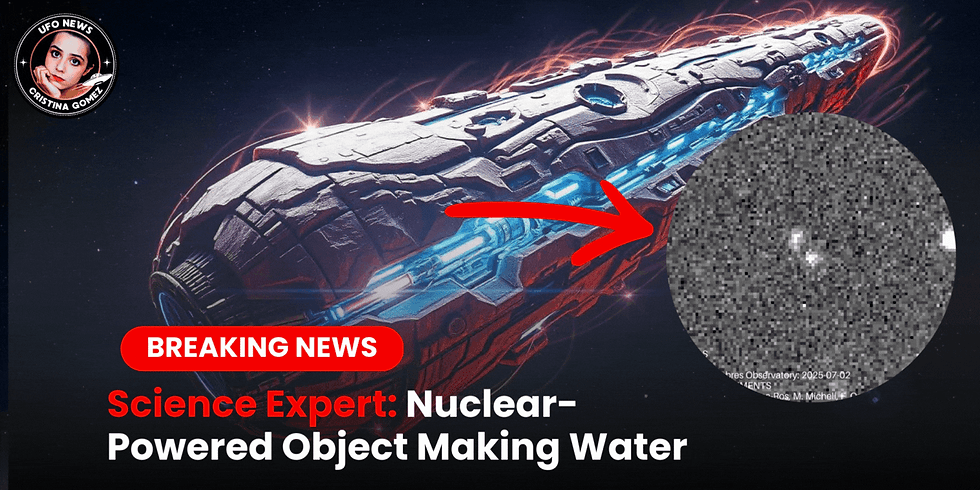UFO Hearing Update: It's Happening
- Cristina Gomez

- Aug 25, 2025
- 3 min read
Ross Coulthart’s stark assessment that congressional UFO hearings are “a dog and pony show” gains new context from Representative Eric Burlison’s revelations to Liberation Times. According to Coulthart, speaking on NewsNation’s Reality Check, lawmakers are “shown and told what we’re allowed to be told,” while the substantive information remains locked in classified briefings. Burlison’s insider perspective explains why: “the Office of the National Security Advisor [the National Security Council staff] is handling these [UAP] Special Access Programs.”
This creates a constitutional reality where Congress operates under executive branch classification authority. The September 9th hearing, featuring three witnesses with alleged “first-hand” experiences, exemplifies these constraints. Congressional members were explicitly told “not to ask some of you certain questions on certain topics” during previous UFO hearings, revealing how intelligence community oversight penetrates even public testimony.
The SCIF Flu Controversy and Institutional Barriers
The recent “SCIF flu” controversy, clarified by NASA official Mike Gold on the Weaponized podcast, illustrates systematic obstacles to information sharing. Gold revealed that witnesses like Lou Elizondo “literally three times we were told it was going to happen and then it didn’t,” forcing costly trips from Wyoming to Washington for canceled meetings. This wasn’t deliberate avoidance but logistical barriers that create additional impediments to disclosure.

Legal expert Richard Beckwith, author of “Need to Know,” explains how the secrecy apparatus employs “mosaic theory” and “state secrets privilege” to block information requests. According to Beckwith, even seemingly innocuous information can be withheld by arguing it could be “pieced together over time by an enemy or an adversary.” His stark assessment: gatekeepers “are not going to disclose it until you pry it from their dead cold fingers.”
Presidential Authority vs. Bureaucratic Control
Burlison’s Liberation Times interview reveals how this secrecy operates within the White House itself, protected by National Security Council elements and career officials embedded in key offices. When asked about President Trump’s UAP commitment, Burlison offered a measured response: “I think that if he has the time and bandwidth, President Trump would [investigate the UAP topic]. To him, this isn’t as high-profile or high-priority as it is to some people.”
Recent mysterious drone incursions over defense installations illustrate these institutional challenges. According to documentation, U.S. forces couldn’t detect or jam objects operating over critical facilities. While the White House downplayed these incidents, Burlison suggested bureaucratic embarrassment: “Never underestimate the ineptitude of government employees and their inability to act. In my view, the most likely scenario is that they don’t know [what the so-called drones were], and they’re embarrassed that they don’t.”
Constitutional Framework
Burlison’s efforts to strengthen the UAP Disclosure Act through the House NDAA reflect his understanding that meaningful change requires presidential action. His realistic assessment: “I don’t think President Trump is going to make the UAPDA a priority, or something his office will lean on to win votes. But I also don’t think his office would fight it.”
Coulthart argues that intelligence community briefings maintain narrative control even over presidents through “carefully crafted briefings that justify continued secrecy.” This suggests that even executive authority may be managed by the same career officials who control congressional testimony.
Congressional hearings serve important functions in building public pressure and normalizing UAP discussions. However, as both Coulthart’s analysis and Burlison’s insider perspective reveal, these sessions operate within executive branch classification boundaries that congressional authority cannot override.
The structural reality remains: meaningful UAP transparency requires presidential willingness to override intelligence community objections and declassify information despite agency resistance — even when that resistance operates within the president’s own administration through embedded bureaucratic structures.
Until that presidential decision occurs, hearings will continue as controlled transparency exercises rather than breakthrough disclosure events, regardless of witness quality or congressional determination to uncover the truth.

Sources
Blumenthal, L. K. (2023, November 25). Intelligence officials say U.S. has retrieved craft of Non-Human Origin. The Debrief. https://thedebrief.org/intelligence-officials-say-u-s-has-retrieved-non-human-craft/
Jeremy Corbell. (2025, August 19). Threats, Intimidation, Prosecution — Daunting Risks & UFO Whistleblowers : WEAPONIZED : Episode #86 [Video]. YouTube. https://www.youtube.com/watch?v=O-Zayi-Ob4E
NewsNation. (2025, August 24). Ross Coulthart Q&A: Skywatcher shocker, Russia UAP facts and the men in black | Reality Check [Video]. YouTube. https://www.youtube.com/watch?v=pWhrYIwKUyI
Sharp, C. (2025, August 18). Exclusive: Representative Eric Burlison talks UFO hearings, the Disclosure Act, and oversight challenges — Liberation Times | Reimagining old news. Liberation Times | Reimagining Old News. https://www.liberationtimes.com/home/exclusive-representative-eric-burlison-talks-ufo-hearings-the-disclosure-act-and-oversight-challenges















Comments